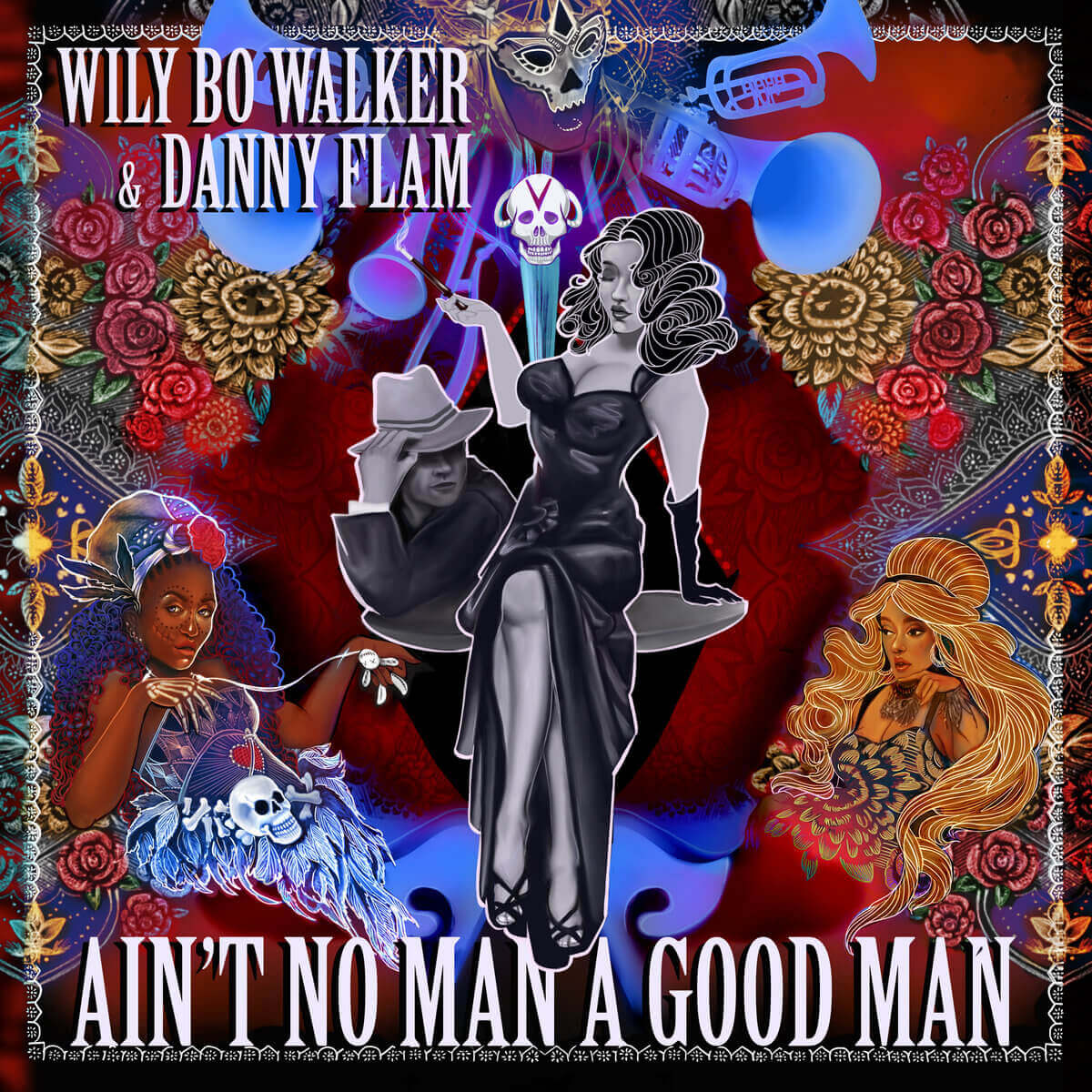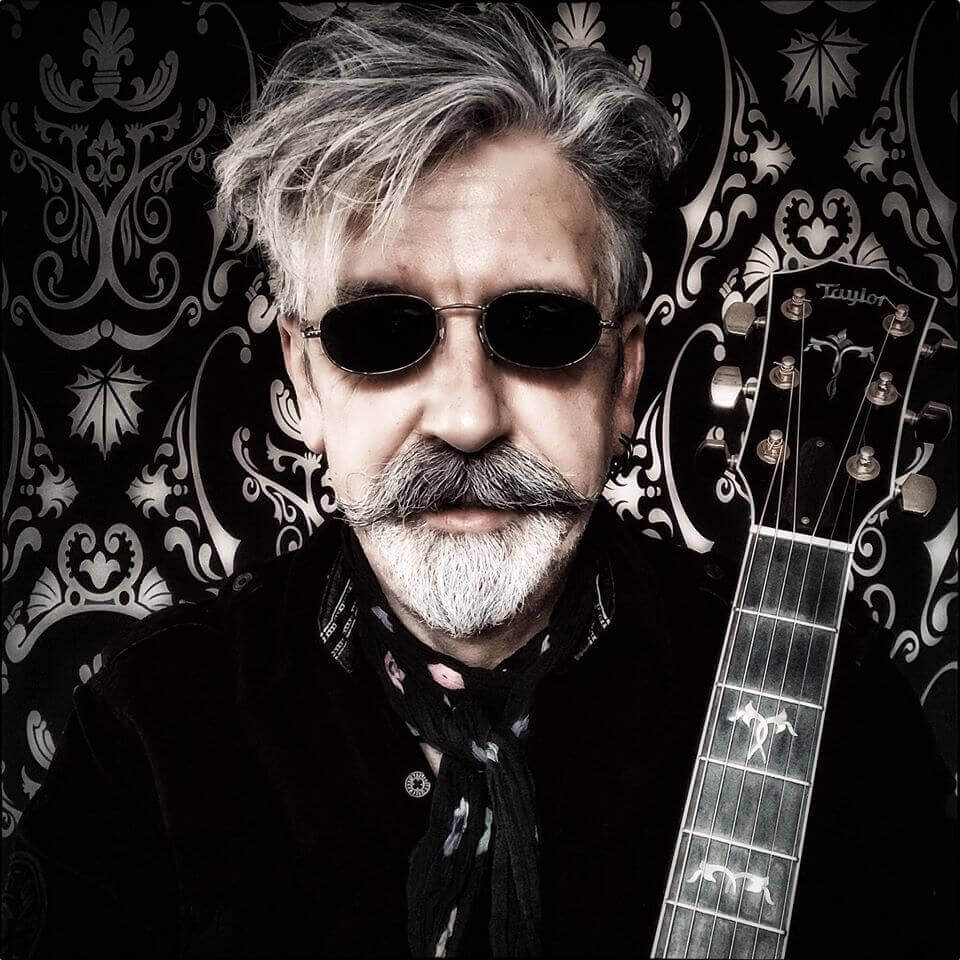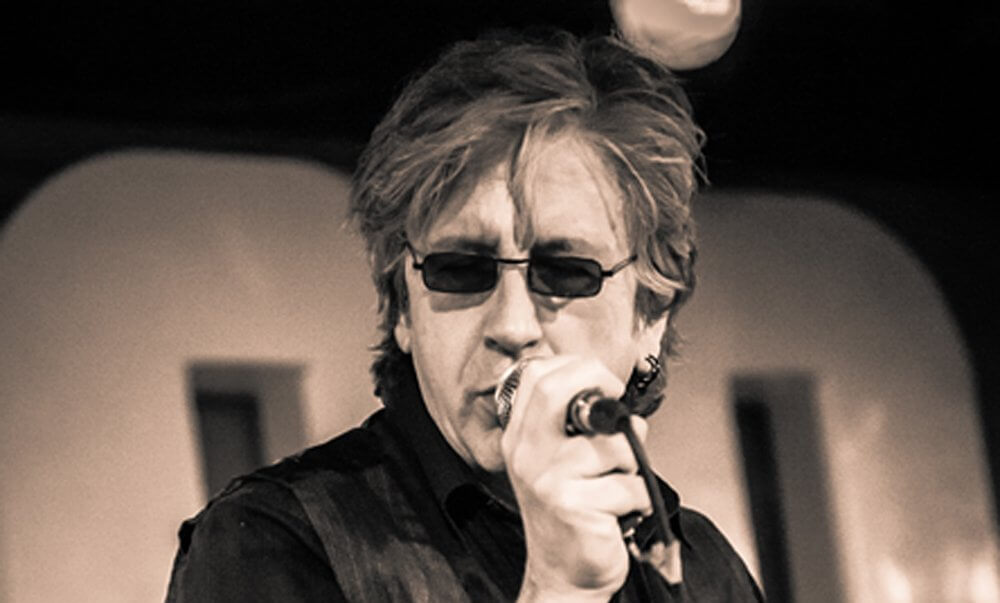Singer/songwriter Wily Bo Walker’s textured voice is distinctive. You recognize the rasp immediately, sounding like a version of Tom Waits raised and trained by Howlin’ Wolf. But as recognizable as his voice is, it’s not the defining characteristic of his music.

You know Walker because of how he weaves character-driven lyrics and blues-rooted music into songs that take off into unexpected places. On Ain’t No Man a Good Man, Walker once again collaborates with horn-player/arranger Danny Flam, creating horn-drenched rock tunes that evoke multiple musical eras.
Walker’s music is constantly evolving, yet he manages to maintain an essence, so that you never feel like you’re listening to a completely different band, even as his sound shifts. Walker’s songs are journeys where he allows the listener to tag along. And no global pandemic is going to slow him down.
Steven Ovadia:
How are you so prolific?
Wily Bo Walker:
I’m lucky that I’ve got quite a wide network of people and also lucky that I’m independent so I can do what I want to do. So I’ve got different kinds of things going on. One of the things that coronavirus has actually allowed me to do is to finish off a lot of sessions that I had started over the past three or four years, which I wouldn’t have had the time to finish in the studio had I been out gigging and rehearsing and doing all the other stuff. So looking positively, 2020 has given me a little bit of time to to finish off a whole lot of stuff that needs to be finished.
And Good Man was recorded pre-coronavirus? Post? Because that’s a lot of horns.
Yeah, the the horns are all recorded pre-corona, although having said, that there were a couple of tracks Danny recorded after he was recovering from corona. I’ve got another friend who’s a sax player in London and she’s had it really badly. It’s been about three months and she still can’t breathe. She doesn’t have that depth of breath to play or to sing and it’s affecting some people a lot. Danny was working on this latest album, and the last two numbers that he recorded for me he was recovering from corona. So he just about made it through the sessions. You know, it’s a difficult thing when you need that breath and it’s terrible when you don’t have it.
How did you hook up with Danny?
It started off 12 years ago, something like that. It was online. Obviously, Danny is in New York. It was through a mutual music network. We were online and discussing the early 70s big horn singer, big soul sound, you know, Blood, Sweat and Tears, Ides of March, that kind of stuff, which I particularly like. All these guys who were doing things back then, I really like that, and I was on this online forum and chatting about how people are doing it with keyboards now. And, it’s kind of odd to me. It just doesn’t have that same feel. And, of course, Danny had this New York Brass and he was totally agreeing with me. And we said ‘why don’t we try and do something together?’
So that’s where that started. We’ve got a similar kind of interest in that kind of music. And Danny does everything, he puts across the whole spectrum of music, but he’s particularly keen on this, this classic R&B. My vocal kind of suits the big horn section backing, so it kind of works. And it’s good fun.
I thought Ain’t No Man was really good. It reminded me a lot of Louis Armstrong between your voice and like all the horns. I thought it had a very cool sort of retro air without being precious.
Yeah. Those guys are legends and you aspire to them. I love Louis Armstrong’s work. Louis Jordan, all these guys that were doing that stuff. It was kind of the popular music of the time. The big horn section, the big band stuff, I really enjoy all of that. There’s a real skill to the charts and the charting of the instruments for these guys, and of course you had the once in a lifetime vocal of Louis Armstrong. What a talent! What a fantastic bloke. I liked Cab Calloway as well. He’s kind of got that showmanship thing going on which I like to bring to the stage. So it’s kind of a fun aspect of things. But yeah, ‘Ain’t No Man,’ I would say is more the 70s thing than going back to the 50s, Armstrong sound. It’s more Blood, Sweat, and Tears and Ides of March and early Chicago; the first album ‘Chicago Transit Authority.’ That that was the huge horn sounds and just groovy music and I just love it. I grew up listening to that kind of stuff.
I love the theme tracks to police shows too, because you know cop shows back then had all of this mad horn section stuff. And it’s just a mad talent that goes into scoring these things. Absolutely great. So if anything its a nod to that time, you know, that’s as much as I can possibly do.
You often collaborate with guitarist E D Brayshaw. What’s the difference between collaborating with E D and working with Danny?
The horn sectional thing is one side of me. E D is much more the guitar driven music. And I love all that kind of stuff too. I’ve got the best of both worlds. E D’s an amazing all-around musician. I’m working on another album with him actually, that we’ll follow up sometime later in the ether. He’s actually a classically trained cellist. So as well as all these mad brilliant guitar solo type stuff that he comes out with, he’s got all the sensitive cello, violin, mandolin, and all this kind of stuff that he plays. He’s such a talented person and great to work with. As I said, it’s a total contrast to the thing that I’m doing now. E D’s not so much into the horn sectional thing. Whereas, you know, I like that as part of my resume, which is part of me. So I’m very lucky to work with all of these talented guys.
One of the things I like about your work is how you’ll like revisit songs between albums.
Yeah. It’s like me doing cover versions of my own stuff. It amuses me. And plus maybe there’s a little bit Scottishness about not paying license fees for covering other people’s songs. I don’t know. (laughs) You can tell it’s the same thing. It’s the same story I’m trying to get across. “Night of the Hunter,” for instance [which appears on ‘Ain’t No Man a Good Man’ and 2019’s ‘Roads We Ride’], E D and I wrote that, kind of, and as part of the whole ‘Roads We Ride,’ that whole cinema thing that we were doing. And I spoke with Danny about it and we looked at it and kind of made it more soundtracky. There’s another guitar player and keyboard player that I’ve got on my ‘Good Man’ album. And it just lends a different texture to the song. For me, I love both versions equally and they’re both great. I just love to hear other people riffing off the song and seeing what they come up with.
I was watching a video recently, it’s kind of a game, looking back at all these greats like Steely Dan. They were producing ‘Aja’ and they were in a certain position because of multi-million pound contracts. So they got on all these top session people to come in and play on the songs, and they just kept going until they found the one that had the exact feel for the song. I mean, that would be a marvelous thing to be able to do. And what great albums, they produced. Down to where I am, you know, working with so many different people, and each person brings something different to the table. It is kind of wild. There’s no wrong way to play this song. If you brought something that significantly changes the mood of the thing, well, I think then it warrants being heard too. “Night of the Hunter” is a good example of that. I think that’s a really nice cover, if you like, of the song we released. And I don’t have to pay a license.

I picture you constantly tinkering with your songs because of the way you’re saying, ‘what would it sound like like this?’ Do you tinker with your songs?
No, no, no, I don’t, no. All of these songs are performances. And that’s something that is just part of what I want to do. I don’t tinker with a song per se. I go to the studio with what songs that we’re going to do. I want to record that version, that moment in time, and get it to its best. So if I do a vocal, for instance, I’ll do three takes in the studio. And if I haven’t got it, I’ll dismiss the song. I just don’t carry on with it. Life’s too short to spend time just tinkering. Of course in my Pro Tools studio, I could be here forever changing stuff, but it doesn’t make sense to me. There’s much, much more to explore. So, I’m not so much a tinkerer. I like to get the good takes. I’ll spend time on production, so that it sounds professional and it’s nice for people to hear, but that is it.
What’s your writing process like? How do you write?
I’ve always got a guitar next to me. But I’m very much lyric driven. And it’s personal stories, but I like to cover it up; the typical Scottish thing of covering up your emotions with something else. So I’ve got this thing that I want to get out but I tell it in the form of a story. It’s storytelling but a lot of it is personal. Although if I’m out, I’ve got my beautiful dog here, I’ve got fields, and I can wander off and walk. And a lot of ideas come just when I’m out, you know, taking exercise. Maybe something I’ve watched. I really love cinema. And there’s some concept of it that I like and that I want to explore [in a song]. And so writing tends to be lyric driven. And then melodies are one of these things that seem to come along with them. I pick up the guitar and and what have you. And when I’m working with people like Danny or E D or anyone else, I give them a rough idea of the concept of the song, and they’ll come back with it and then we kind of work up the whole thing that way.
When you’re writing, do you have visual images in your head? Are you picturing the song and what it looks like as a movie or as a show?
Yeah, I think so. My writing notes, which I have got dashed all over my desk here, they’re the little bits of thoughts on how I’m feeling . So it might come out as maybe a chorus line or what have you. But when I’m writing the finished thing, when I’m fine polishing it up, I do tend to take it into the third person. So then I visualize this other person, whether it’s a character in an imaginary film, a “Theme for an Imaginary Western,” to use a Jack Bruce type thing. So this imaginary cinema, which I mean, I would love to do, I think ever since I was a child, whenever I listen to music, especially stuff that involves long guitar solos that you just sort of drift off into this music and there are things happening then. And I just love that aspect of it. There are long solo songs on ‘The Roads We Ride’. And it’s kind of like the cinema in your head where you go with your imagination and if if a song or a piece of music can take you somewhere else well I think it’s achieved something. That’s the kind of driving thing behind what I’m doing. If it can give somebody the same feeling I get listening to a piece of music.
This is just more a personal curiosity but are you a big Loudon Wainwright III fan? I know you’ve covered “Motel Blues” a few times. I’m always a little surprised.
I can’t say that I’m a huge fan of Loudon. I can’t say that I’ve listened to a lot of his music. Now the reason “Motel Blues” is kind of special to me, it was on on an album that my good friend bought when I was about 16. So formative years. It was a sampler album called ‘New Age of Atlantic,’ it was 73-74 something like that [NOTE: 1972]. He bought it because there was a rare Yes song on it: Yes with a cover of “America,“ the Simon and Garfunkel track, but this album also had John Prine, Dr. John, Loudon Wainwright, and a guy called Gordon Haskell, and these tracks were just stunning to me. The songwriting element of it was just mind blowing.
So I learned “Motel Blues” back then and I’ve played it since in various forms, whether it’s solo acoustic gigs or what have you. It’s just traveled with me. It just resonated back then and it still resonates with me, but that’s to say, I can’t say that I’m a a huge fan of Loudon Wainwright. You know, I like his music, of course, but I haven’t gone out to buy tons of his stuff. I liked the kind of empty loneliness to the production of it, that song back then, I think it was off ‘Album II’. It was on this ‘New Age of Atlantic’ sampler and it was a standalone track for me. And it was just it was a feeling that he evoked with production: really sparse. It’s him, telling a story. Nice reverb room, acoustic guitar, and [Wainwright’s] plaintive voice. I just love it. It still tingles up the spine when I listen to it.
So what else do you listen to to unwind? Steely Dan?
When I was growing up Steely Dan was the thing. I was big into their horn section stuff. Of course they had the horns going in there and they had this great production. What do I listen to? Recent bands? One of the last gigs I went to see was Black Pumas. I went over to Amsterdam to see them at the beginning of the year when gigs were a thing. Gosh I miss gigs. Who else? Americana. The Lowest Pair. I love them. I saw them at the Green Note in Camden a couple of years ago. Really good. And the second to last gig I saw was Amigo the Devil. I don’t know if you’ve heard this guy, but it’s Southern Gothic, and it’s him with an acoustic guitar. But he plays it through pedals he kind of goes down well at heavy metal gigs; it’s a real odd thing. And he’s just wonderful on stage. It’s this bloke singing these mad songs with a real twist in the lyrics and it’s the lyrics that got me when I first heard this guy. And yeah, a good memory for me to have. So it’s people like that.
It’s a golden age for music in many ways.
It is. Because you know, small artists can release music. Bandcamp’s great because it can suggest all these people you can tap into. Even Spotify will suggest new artists and it’s fab. People can record stuff. I mean there always has been a quality thing going on but for me I’m looking for a particular thing; especially an Americana thing. There’s a goldmine of good lyrics. I just love when somebody puts a twist on a song that I never would have thought of and it moves me. I think of the two people in the Lowest Pair. I think they both write independently of each other, but they come together and do these wonderful harmonies and they’ve got this great banjo thing going on. And the lyrics are out of this world. They take me somewhere else. I’m there, wherever they’re describing, and it’s fantastic, you know? What’s a great talent.
It’s just nice to hear about positive things coming out of the pandemic.
Absolutely! I blame David Bowie, you know, whatever it was, and things have just gone down ever since [he died].
He was holding it all together.
In the UK, we’ve had this whole Brexit thing which is hanging over us. And then we’ve had all of a sudden all the politics that affects everybody’s daily lives. You have that, which I ignore most of the time. And now we’re focused on this virus. It’s kind of a time to not be online so much. I’ve got my dog. Then we disappear into the wilderness and just look at the sky.


